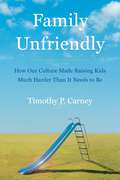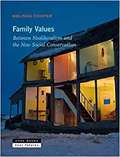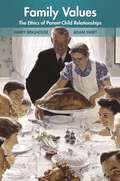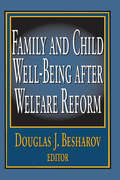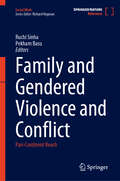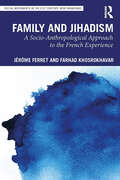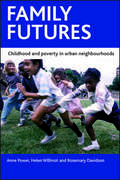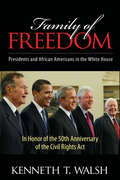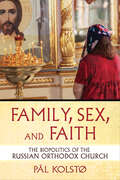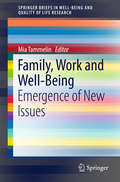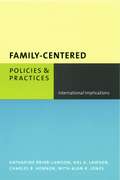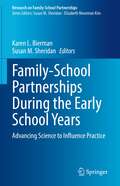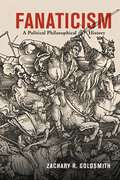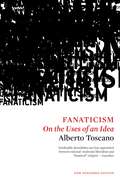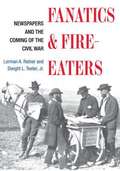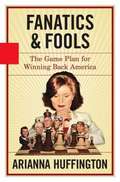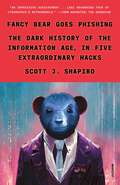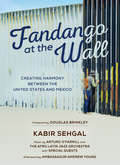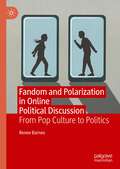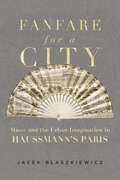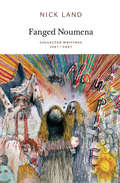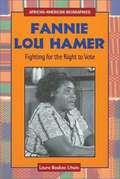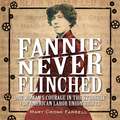- Table View
- List View
Family Unfriendly: How Our Culture Made Raising Kids Much Harder Than It Needs to Be
by Timothy P CarneyThe bestselling author of Alienated America traveled the country asking families and experts the same two questions: Why is parenting so hard now? And why are the results so bad?Our culture tells parents there's one best way to raise kids: enroll them in a dozen activities, protect them from trauma, and get them into the most expensive college you can. If you can't do that, don't bother.How is that going? Record rates of anxiety, depression, medication, debts, loneliness and more. In Family Unfriendly, bestselling author and Washington Examiner columnist Timothy P. Carney says it's time to end this failed experiment in overparenting.Have more kids, have more fun, cancel the travel soccer games, let your kids wander off, and give them deeper sources of meaning than material success. This is an old-fashioned view, but every day the evidence validates it. Drawing on rigorous research—both as a reporter and as a dad of six—Carney demonstrates why modern parenting is so misguided. The high standards set for modern American parenting are unrealistic and setting parents—and our kids—up to fail.Researched over three years and written in between rec baseball games and church picnics where nobody was watching the kids, Family Unfriendly is deeply wise, energetically told, and destined to be the most consequential book about parenting in years.
Family Values: Between Neoliberalism and the New Social Conservatism (Near Future)
by Melinda CooperWhy was the discourse of family values so pivotal to the conservative and free-market revolution of the 1980s and why has it continued to exert such a profound influence on American political life? Why have free-market neoliberals so often made common cause with social conservatives on the question of family, despite their differences on all other issues? In this book, Melinda Cooper challenges the idea that neoliberalism privileges atomized individualism over familial solidarities, and contractual freedom over inherited status. Delving into the history of the American poor laws, she shows how the liberal ethos of personal responsibility was always undergirded by a wider imperative of family responsibility and how this investment in kinship obligations is recurrently facilitated the working relationship between free-market liberals and social conservatives. <p><p> Neoliberalism, she argues, must be understood as an effort to revive and extend the poor law tradition in the contemporary idiom of household debt. As neoliberal policymakers imposed cuts to health, education, and welfare budgets, they simultaneously identified the family as a wholesale alternative to the twentieth-century welfare state. And as the responsibility for deficit spending shifted from the state to the household, the private debt obligations of family were defined as foundational to socioeconomic order. Despite their differences, neoliberals and social conservatives were in agreement that the bonds of family needed to be encouraged―and at the limit enforced―as a necessary counterpart to market freedom. <p><p> In a series of case studies ranging from Bill Clinton's welfare reform to the AIDS epidemic and from same-sex marriage to the student loan crisis, Cooper explores the key policy contributions made by neoliberal economists and legal theorists. Only by restoring the question of family to its central place in the neoliberal project, she argues, can we make sense of the defining political alliance of our times, that between free-market economics and social conservatism.
Family Values: The Ethics of Parent-Child Relationships
by Adam Swift Harry BrighouseThe family is hotly contested ideological terrain. Some defend the traditional two-parent heterosexual family while others welcome its demise. Opinions vary about how much control parents should have over their children's upbringing. Family Values provides a major new theoretical account of the morality and politics of the family, telling us why the family is valuable, who has the right to parent, and what rights parents should—and should not—have over their children.Harry Brighouse and Adam Swift argue that parent-child relationships produce the "familial relationship goods" that people need to flourish. Children's healthy development depends on intimate relationships with authoritative adults, while the distinctive joys and challenges of parenting are part of a fulfilling life for adults. Yet the relationships that make these goods possible have little to do with biology, and do not require the extensive rights that parents currently enjoy. Challenging some of our most commonly held beliefs about the family, Brighouse and Swift explain why a child's interest in autonomy severely limits parents' right to shape their children's values, and why parents have no fundamental right to confer wealth or advantage on their children.Family Values reaffirms the vital importance of the family as a social institution while challenging its role in the reproduction of social inequality and carefully balancing the interests of parents and children.
Family and Child Well-being After Welfare Reform
by Douglas J. BesharovSince their historic high in 1994, welfare caseloads in the United States have dropped an astounding 59 percent--more than 5 million fewer families receive welfare. Family and Child Well-Being after Welfare Reform, now in paperback, explores how low-income children and their families are faring in the wake of welfare reform. Contributors to the volume include leading social researchers. Can existing surveys and other data be used to measure trends in the area? What key indicators should be tracked? What are the initial trends after welfare reform? What other information or approaches would be helpful? The book covers a broad range of topics: an update on welfare reform (Douglas J. Besharov and Peter Germanis); ongoing major research (Peter H. Rossi); material well-being, such as earnings, benefits, and consumption (Richard Bavier); family versus household (Wendy D. Manning); fatherhood, cohabitation, and marriage (Wade F. Horn); teenage sex, pregnancy, and nonmarital births (Isabel V. Sawhill); child maltreatment and foster care (Richard J. Gelles); homelessness and housing (John C. Weicher); child health and well-being (Lorraine V. Klerman); nutrition, food security, and obesity (Harold S. Beebout); crime, juvenile delinquency, and dysfunctional behavior (Lawrence W. Sherman); drug use (Peter Reuter); mothers' work and child care (Julia B. Isaacs); and the activities of the U.S. Department of Health and Human Services (Don Winstead and Ann McCormick). When welfare reform was first debated, many people feared that it would hurt the poor, especially children. The contributors find little evidence to suggest this has occurred. As time limits and other programmatic requirements take hold, more information will be needed to assess the condition of low-income families after welfare reform. This informative volume establishes a baseline for that assessment.
Family and Gendered Violence and Conflict: Pan-Continent Reach (Social Work)
by Ruchi Sinha Pekham BasuThis reference work collates academic discourses and practices around family, gender, and violence in social work. A huge body of discourse is available that categorizes and labels acts of violence, and correspondingly practices that pin blame/responsibility for the violence. These have led to evolution of intervention strategies to resolve or address the violence. Some explanations foreground systemic causes; others look at person-centric causes. The two views bring forth the fundamental ontological divide of structuralism and individualism. The question for social workers to debate is what to factor in while working with families experiencing violence and conflict. What amongst the person, the agency, or the structure needs to be addressed to understand the experience of families in conflict and violence? Are these positions supplementary, complementary, or to be understood reflexively? With the inclusion of new families, the parochial understanding of families has long been dislodged and given way to newer, radical, and contextual understanding of families. Similarly, different people, agencies, and states understand violence and conflict differently. Gender, too, has moved from the binaries of male and female to the gender-diverse LGBTQIA+ identities. The book positions the ontological premise on which the epistemological practise is located. Simply put, the person-centric ontology on families and violence epistemologically finds understanding in agency-based approaches in individual agency, whereas the structure-based approaches find the experience of families and violence in society, state, and the world order. The contributors locate their work around identification, definition, an intervention or empirical study, policy analysis, historical evolution of concepts, and ontological and paradigmatic debates to position their individual chapters. Family and Gendered Violence and Conflict: Pan-Continent Reach provides a paradigmatic prism for practice for social workers who are equipped to interpret context differently. The differing and competing paradigmatic lenses cannot be mediated, resolved, or addressed, but they definitely can be understood and debated to provide a 360-degree lens on the issues of families in violence in the gendered context. The reference work is a useful resource for social work practitioners, educators, academicians, researchers, and other development professionals.
Family and Jihadism: A Socio-Anthropological Approach to the French Experience (Social Movements in the 21st Century: New Paradigms)
by Jérôme FerretThis volume explores the paramount importance of family to jihadism in France, Spain and in Europe more generally. In France, special focus is given to the Mohammed Merah paradigmatic case study in the Toulouse region. In Spain, attention is given to the North and to Catalonia. With attention to both the concrete family - often in crisis - and the imaginary family invented by radicalized youth to substitute, this book shows the fundamental need among many jihadists to reconstitute the family, whether in the form of a clan or the imagined Caliphate (or neo-Ummah): a form of shared existence that offers escape from societies in which jihadists feel ill-at-ease. Demonstrating the failure of an emphasis on the individual actor to capture the meaning of jihadism, Family and Jihadism reveals the fundamental importance to our understanding of jihadist activity of the family (in an extended anthropological sense) - real or imagined - into which the individual is inserted. A study of the crisis of family and the re-creation of a new, enlarged family in the lives of young jihadists, this book will appeal to scholars of sociology, anthropology, politics and security studies with interests in radicalisation, political violence, social movements and religious violence.
Family futures: Childhood and poverty in urban neighbourhoods
by Anne Power Helen WillmotFamily life in areas of concentrated poverty and social problems is undermined by surrounding conditions. This timely book, by acclaimed author Anne Power and her team, is based on a unique longitudinal study of over 200 families interviewed annually over the last decade. It examines the initiatives introduced to help such families and the impacts on them, their future prospects and the implications for policy. Accessibly written and with clear data presentation, the book will have wide appeal to people who work with, live in and care about families, children and low-income areas.
Family of Freedom: Presidents and African Americans in the White House
by Kenneth T. WalshBarack Obama is the first African American President, but the history of African Americans in the White House long predates him. The building was built by slaves, and African Americans have worked in it ever since, from servants to advisors. In charting the history of African Americans in the White House, Kenneth T. Walsh illuminates the trajectory of racial progress in the US. He looks at Abraham Lincoln and his black seamstress and valet, debates between President Johnson and Martin Luther King over civil rights, and the role of black staff members under Nixon and Reagan. Family of Freedom gives a unique view of US history as seen through the experiences of African Americans in the White House.
Family, Sex, and Faith: The Biopolitics of the Russian Orthodox Church (NIU Series in Slavic, East European, and Eurasian Studies)
by Pål KolstøFamily, Sex, and Faith is the first systematic examination of what the Russian Orthodox Church (ROC) teaches and how believers respond to its messages regarding issues such as marriage, divorce, contraception, abortion, husband-wife relations, and LGBTQIA+ rights. According to Pål Kolstø, for the ROC, the ethics of private life involve what Michel Foucault called "biopolitics": the state regulates the sex lives of its citizens to control the development of the population.Family, Sex, and Faith offers a systematic analysis of aspects of the moral theology of the ROC, discussing the means and strategies it employs to achieve its goals, to counter resistance, and to emerge victorious from the battles in which it is embroiled. Although the constitution defines Russia as a secular state, the ROC has achieved a privileged position in society, functioning as a major provider of ideology and legitimacy for the Putin regime.
Family, Work and Well-Being: Emergence Of New Issues (SpringerBriefs in Well-Being and Quality of Life Research)
by Mia TammelinThis book analyses the current state-of-the-art research on families, working hours and well-being in Europe, addressing both paid and non-paid work from a family perspective, and introducing emerging issues related to working hours and family life. Further, it discusses the implications of these issues for the well-being of individuals and families. Examining topics such as the division of paid and non-paid work within families, flexibility patterns, the 24/7 society, intensification of work, and the implication of mobile technology for work–family relations, it illustrates how the experiences of working families differ depending on their socio-economic status
Family-Centered Policies and Practices: International Implications
by Katharine Briar-Lawson Hal Lawson Charles HennonAnalyzing the critical juncture of family-centered policy and practice, this book places the universal institution of the family in a global context. By including a conceptual framework as well as practice components, the authors offer an original multimodal approach toward understanding family-centered policy practice from an international perspective. It provides grassroots strategies for activists and practical guides for both students and practitioners and includes cutting-edge interpretations of the impact of globalization on families, social workers, and other helping professionals and advocates.
Family-School Partnerships During the Early School Years: Advancing Science to Influence Practice (Research on Family-School Partnerships)
by Susan M. Sheridan Karen L. BiermanThis book presents research-based family-school intervention programs that target the specific developmental period of preschool through the early elementary years, focusing on promoting positive child transitions into school. It explores critical intervention issues, including the need to understand mechanisms of efficacy, issues with real-world implementation, and methods for scaling family-school interventions. The volume references developmental research to highlight the importance of family-school partnerships at this critical transition period. Several chapters briefly describe research on proven intervention models that are effective in promoting family-school partnerships as children enter kindergarten and foster positive school outcomes. Each chapter concludes with a review of the most critical next steps in family-school intervention research within the context of the early school years. At the end of the book, several commentary chapters address overall implications for future research and methods for advancing the field, including perspectives on research-informed family-school practices and policies. Not only does the volume highlight interventions that work effectively to engage families with schools, it focuses on identifying critical components and processes that may underlie effective intervention outcomes and offers agendas for future research and intervention diffusion efforts. Key topics of coverage include: Presenting the logic model of the intervention program.Exploring questions concerning critical elements of family-school partnerships that may account for children’s positive outcomes.Discussing the challenges and strategies for scalability and broad diffusion. Family-School Partnerships During the Early School Years is a valuable resource for researchers, professionals and graduate students in child and school psychology, educational policy and politics, family studies, developmental psychology, sociology of education, sociology, and anthropology.
Famine in North Korea: Markets, Aid, and Reform
by Stephan Haggard Marcus NolandIn the mid-1990s, as many as one million North Koreans died in one of the worst famines of the twentieth century. Stephan Haggard and Marcus Noland present the most comprehensive and penetrating account of the famine to date, examining not only the origins and aftermath of the crisis but also the regime's response to outside aid and the effect of its current policies on the country's economic future. North Korea's famine exemplified the depredations that can arise from tyrannical rule and the dilemmas such regimes pose for the humanitarian community. To reveal the state's culpability is a vital project of historical recovery, especially in light of our current engagement with the "North Korean question."
Famine in North Korea: Markets, Aid, and Reform
by Stephan Haggard Marcus NolandIn the mid-1990s, as many as one million North Koreans died in one of the worst famines of the twentieth century. The socialist food distribution system collapsed primarily because of a misguided push for self-reliance, but was compounded by the regime's failure to formulate a quick response-including the blocking of desperately needed humanitarian relief. As households, enterprises, local party organs, and military units tried to cope with the economic collapse, a grassroots process of marketization took root. However, rather than embracing these changes, the North Korean regime opted for tentative economic reforms with ambiguous benefits and a self-destructive foreign policy. As a result, a chronic food shortage continues to plague North Korea today. In their carefully researched book, Stephan Haggard and Marcus Noland present the most comprehensive and penetrating account of the famine to date, examining not only the origins and aftermath of the crisis but also the regime's response to outside aid and the effect of its current policies on the country's economic future. Their study begins by considering the root causes of the famine, weighing the effects of the decline in the availability of food against its poor distribution. Then it takes a close look at the aid effort, addressing the difficulty of monitoring assistance within the country, and concludes with an analysis of current economic reforms and strategies of engagement.North Korea's famine exemplified the depredations that can arise from tyrannical rule and the dilemmas such regimes pose for the humanitarian community, as well as the obstacles inherent in achieving economic and political reform. To reveal the state's culpability in this tragic event is a vital project of historical recovery, one that is especially critical in light of our current engagement with the "North Korean question."
Fanaticism: A Political Philosophical History
by Zachary R. GoldsmithAs the post-WWII liberal democratic consensus comes under increasing assault around the globe, Zachary R. Goldsmith investigates a timely topic: the reemergence of fanaticism. His book demonstrates how the concept of fanaticism, so often flippantly invoked with little forethought, actually has a long history stretching back to ancient times. Tracing this history through the Reformation and the Enlightenment to our present moment of political extremism run amok, Goldsmith offers a novel account of fanaticism, detailing its transformation from a primarily religious to a political concept around the time of the French Revolution. He draws on the work of Immanuel Kant, Edmund Burke, and Fyodor Dostoevsky—all keen observers of fanaticism, and especially its political variant—in order to explore this crucial moment in the development of political fanaticism.Examining conceptualizations of fanaticism from different geographical, political, temporal, and contextual backgrounds, Goldsmith reveals how the concept has changed over time and resists easy definition. Nevertheless, his analysis of the writings of key figures from the tradition of political thought regarding fanaticism yields a complex and nuanced understanding of the concept that allows us to productively identify and observe its most salient characteristics: irrationality, messianism, the embrace of abstraction, the desire for novelty, the pursuit of perfection, a lack of limits in politics, the embrace of violence, certainty, passion, and its perennial attraction to intellectuals. Goldsmith’s political-philosophical history of fanaticism offers us an argument and warning against fanaticism itself, demonstrating that fanaticism is antidemocratic, illiberal, antipolitical, and never necessary.
Fanaticism: On the Uses of an Idea
by Alberto ToscanoA genealogy of fanaticism—unearthing its long history, before it became a tool in the Clash of CivilizationsThe idea of fanaticism as a deviant or extreme variant of an already irrational set of religious beliefs is today invoked by the West in order to demonize and psychologize any non-liberal politics.Alberto Toscano’s compelling and erudite counter-history explodes this accepted interpretation in exploring the critical role fanaticism played in forming modern politics and the liberal state. In a radical new interpretation, he places the fanatic at the very heart of politics, arguing that historical and revolutionary transformations require a new understanding of his role. Showing how fanaticism results from the failure to formulate an adequate emancipatory politics, this illuminating history sheds new light on an idea that continues to dominate debates about faith and secularism.From the Trade Paperback edition.
Fanatics and Fire-eaters: Newspapers and the Coming of the Civil War
by Lorman A. Ratner Dwight L. Teeter Jr.In the troubled years leading up to the Civil War, newspapers in the North and South presented the arguments for and against slavery, debated the right to secede, and disputed the Dred Scott decision, denouncing opposing viewpoints with imagination and vigor. Although it is impossible to determine the precise effect of the newspapers on their readers, there is no question that they took the temperature of their communities and recorded the rising local agitations, unifying opinions, raising alarms, and cementing prejudices. Lorman A. Ratner and Dwight Teeter's Fanatics and Fire-Eaters ably demonstrates the power of a fast-growing media to influence both perception and the course of events.
Fanatics and Fools: The Game Plan for Winning Back America
by Arianna HuffingtonAs America's leaders fight pre-emptive wars abroad and ordinary Americans fight to keep their heads above water here at home, Arianna Huffington offers a no-holds-barred account of where we stand and a clear and remarkable vision of where we should be headed.
Fancy Bear Goes Phishing: The Dark History of the Information Age, in Five Extraordinary Hacks
by Scott J. Shapiro“Unsettling, absolutely riveting, and—for better or worse—necessary reading.” —Brian Christian, author of Algorithms to Live By and The Alignment ProblemAn entertaining account of the philosophy and technology of hacking—and why we all need to understand it.It’s a signal paradox of our times that we live in an information society but do not know how it works. And without understanding how our information is stored, used, and protected, we are vulnerable to having it exploited. In Fancy Bear Goes Phishing, Scott J. Shapiro draws on his popular Yale University class about hacking to expose the secrets of the digital age. With lucidity and wit, he establishes that cybercrime has less to do with defective programming than with the faulty wiring of our psyches and society. And because hacking is a human-interest story, he tells the fascinating tales of perpetrators, including Robert Morris Jr., the graduate student who accidentally crashed the internet in the 1980s, and the Bulgarian “Dark Avenger,” who invented the first mutating computer-virus engine. We also meet a sixteen-year-old from South Boston who took control of Paris Hilton’s cell phone, the Russian intelligence officers who sought to take control of a US election, and others.In telling their stories, Shapiro exposes the hackers’ tool kits and gives fresh answers to vital questions: Why is the internet so vulnerable? What can we do in response? Combining the philosophical adventure of Gödel, Escher, Bach with dramatic true-crime narrative, the result is a lively and original account of the future of hacking, espionage, and war, and of how to live in an era of cybercrime.Includes black-and-white images
Fandango at the Wall: Creating Harmony Between the United States and Mexico
by Douglas Brinkley Andrew Young Kabir Sehgal Arturo O'Farrill Afro Latin Jazz Orchestra with Special GuestsMulti-Grammy-winning producer and New York Times bestselling author Kabir Sehgal examines the relationship between the US and Mexico, accompanied by music from Grammy-winning musician Arturo O'Farrill and special guests, an extended foreword from historian Douglas Brinkley, and afterword by Ambassador Andrew Young. The US-Mexican relationship has involved periods of great friendship with robust trade and loose immigration policies. But its history has also been beset by wars, drug trade, and human trafficking. With the latest xenophobic turn toward Mexico, this book contextualizes the latest swing in the up-and-down, two-hundred-year history of these two countries. In a lyrical narrative reflecting on Fandango Fronterizo, an annual musical celebration held on both sides of the border wall, Sehgal addresses how the broken US-Mexico relationship has been repaired in the past and continues to adapt today. FANDANGO AT THE WALL provides clarity to the current debate regarding construction of the wall and America's posture toward immigration. Sehgal and his artistic collaborators brought over thirty musicians from various traditions to the San Diego-Tijuana border to record a musical repertoire composed of son jarocho songs from Veracruz, Mexico and Latin jazz. With these tunes accompanying a call-to-action narrative, FANDANGO AT THE WALL demonstrates how music can heal and provide a soundtrack for the US, Mexico, and beyond.
Fandom and Polarisation in Online Political Discussion: From Pop Culture to Politics
by Renee BarnesThis book takes an innovative fan studies approach to investigating one of the most pressing issues of contemporary times: polarization. Drawing on three years of observational data from Facebook political discussions, as well as interviews and survey responses from those heavily engaged in online political debate, Barnes argues a fan-like investment in a political perspective initiates and drives polarization. She calls on us to move beyond the traditional Habermasian approach to political discussion, which privileges the rational and deliberative, and instead focus on how we perform the self. How we behave in these online debates is part of a performance, a performance of self, in which an affective investment in a particular political perspective drives a need to contribute, refute and ‘other’ those opposing. Because this performance stems from an emotional basis, judgments and contributions are often not rational or factual, but rather a form of establishing and defending an identity.
Fanfare for a City: Music and the Urban Imagination in Haussmann's Paris
by Jacek BlaszkiewiczFanfare for a City invites us to listen to the sounds of Paris during the Second Empire (1852–1870), a regime that oversaw dramatic social change in the French capital. By exploring the sonic worlds of exhibitions, cafés, streets, and markets, Jacek Blaszkiewicz shows how the city's musical life shaped urban narratives about le nouveau Paris: a metropolis at a crossroads between its classical, Roman past and its capitalist, imperial future. At the heart of the narrative is "Baron" Haussmann, the engineer of imperial urbanism and the inspiration for a range of musical responses to modernity, from the enthusiastic to the nostalgic. Drawing on theoretical approaches from historical musicology, urban sociology, and sound studies to shed light on newly surfaced archival material, Fanfare for a City argues that urbanism was a driving force in how nineteenth-century music was produced, performed, and policed.
Fanged Noumena: Collected Writings 1987-2007
by Nick LandA dizzying trip through the mind(s) of the provocative and influential thinker Nick Land. During the 1990s British philosopher Nick Land's unique work, variously described as “rabid nihilism,” “mad black deleuzianism,” and “cybergothic,” developed perhaps the only rigorous and culturally-engaged escape route out of the malaise of “continental philosophy” —a route that was implacably blocked by the academy. However, Land's work has continued to exert an influence, both through the British “speculative realist” philosophers who studied with him, and through the many cultural producers—writers, artists, musicians, filmmakers—who have been invigorated by his uncompromising and abrasive philosophical vision. Beginning with Land's early radical rereadings of Heidegger, Nietzsche, Kant and Bataille, the volume collects together the papers, talks and articles of the mid-90s—long the subject of rumour and vague legend (including some work which has never previously appeared in print)—in which Land developed his futuristic theory-fiction of cybercapitalism gone amok; and ends with his enigmatic later writings in which Ballardian fictions, poetics, cryptography, anthropology, grammatology and the occult are smeared into unrecognisable hybrids. Fanged Noumena gives a dizzying perspective on the entire trajectory of this provocative and influential thinker's work, and has introduced his unique voice to a new generation of readers.
Fannie Lou Hamer: Fighting for the Right to Vote
by Laura Baskes LitwinA biography of the civil rights activist who devoted her life to helping blacks register to vote and gain a national political voice.
Fannie Never Flinched: One Woman's Courage in the Struggle for American Labor Union Rights
by Mary Cronk FarrellFannie Sellins (1872&;1919) lived during the Gilded Age of American Industrialization, when the Carnegies and Morgans wore jewels while their laborers wore rags. Fannie dreamed that America could achieve its ideals of equality and justice for all, and she sacrificed her life to help that dream come true. Fannie became a union activist, helping to create St. Louis, Missouri, Local 67 of the United Garment Workers of America. She traveled the nation and eventually gave her life, calling for fair wages and decent working and living conditions for workers in both the garment and mining industries. Her accomplishments live on today. This book includes an index, glossary, a timeline of unions in the United States, and endnotes.
